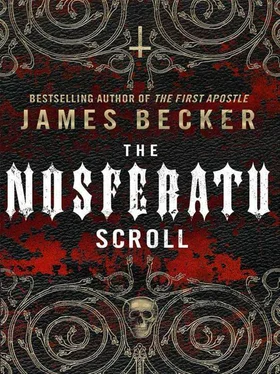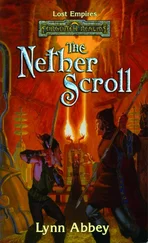James Becker - The Nosferatu Scroll
Здесь есть возможность читать онлайн «James Becker - The Nosferatu Scroll» весь текст электронной книги совершенно бесплатно (целиком полную версию без сокращений). В некоторых случаях можно слушать аудио, скачать через торрент в формате fb2 и присутствует краткое содержание. Жанр: Триллер, на английском языке. Описание произведения, (предисловие) а так же отзывы посетителей доступны на портале библиотеки ЛибКат.
- Название:The Nosferatu Scroll
- Автор:
- Жанр:
- Год:неизвестен
- ISBN:нет данных
- Рейтинг книги:4 / 5. Голосов: 1
-
Избранное:Добавить в избранное
- Отзывы:
-
Ваша оценка:
- 80
- 1
- 2
- 3
- 4
- 5
The Nosferatu Scroll: краткое содержание, описание и аннотация
Предлагаем к чтению аннотацию, описание, краткое содержание или предисловие (зависит от того, что написал сам автор книги «The Nosferatu Scroll»). Если вы не нашли необходимую информацию о книге — напишите в комментариях, мы постараемся отыскать её.
The Nosferatu Scroll — читать онлайн бесплатно полную книгу (весь текст) целиком
Ниже представлен текст книги, разбитый по страницам. Система сохранения места последней прочитанной страницы, позволяет с удобством читать онлайн бесплатно книгу «The Nosferatu Scroll», без необходимости каждый раз заново искать на чём Вы остановились. Поставьте закладку, и сможете в любой момент перейти на страницу, на которой закончили чтение.
Интервал:
Закладка:
Bronson spotted a narrow bay where he thought he could easily beach his craft. He took a quick look around, but there were no other boats near him, and less than ten minutes later, he was hauling on the bow line to pull the powerboat a few feet further up the muddy beach. He turned off the outboard motor, tied the rope around the trunk of a small tree that was growing near the beach, checked he had his binoculars and the pistol — just in case — and made his way quickly across the small island until he could see his target.
He had quite a good view of the front of the house, and of the small inlet with its wooden jetty, and the launch moored against it. He lay down, resting on his elbows, and peered through the binoculars. There was no sign of life around the house so he switched his attention to the lagoon that lay beyond the island.
And then, perhaps a quarter of a mile away, he saw an approaching police launch, its distinctive colour scheme making it quite unmistakable. It looked as if Bianchi had done what he had promised, and had despatched a police patrol to check out the island. Bronson was glad that both he and his powerboat were well out of sight.
He moved the binoculars again, and looked back at the house. It was, like many of the other properties he’d seen on the outlying islands, built of a kind of grey stone, the windows fitted with wooden shutters and the roof covered in terracotta tiles. But as he looked at it again, he was struck by something else. All the shutters on the windows were firmly closed, and the house seemed to exude an indefinable sense of desolation, of emptiness. If he hadn’t known better — if he hadn’t seen the two men in the powerboat arrive with his own eyes — he would have assumed that it was deserted.
But then, bearing in mind the activities of the group that had snatched Angela, they would hardly be likely to advertise their presence.
The police launch was now much closer. It had slowed down, and the bow wave was about half the size it had been previously. As Bronson watched, the boat swung around the end of the island and slowed even more, finally coming to a halt beside the entrance to the inlet, where the driver of the vessel reversed the direction of the propeller in a short burst to bring the boat to a stop. He didn’t steer the boat into the inlet, which puzzled Bronson for a moment until he focused the binoculars more carefully and saw a substantial chain locked across the seaward end of the inlet, preventing the launch from entering.
Two police officers leapt nimbly on to the jetty from the cockpit of the launch and walked unhurriedly along a gravel path towards the house. At the front door they paused and then one of them pressed the bell push. But the door remained firmly closed and there was no sign of life whatsoever from the house. Eventually, the officers stepped back from the door and looked up at the house. Even from the distance he was watching, Bronson saw one of them give an expressive shrug of his shoulders, then they walked back to the police launch and got back on board. The driver gunned the engine, turned sharply in a sudden spray of white water and accelerated away from the island.
For a few seconds, Bronson just lay there staring through the binoculars at the departing vessel. As searches went, the most accurate description of what he’d just witnessed would be ‘pathetic’. The officers had made no attempt to look around the island, to try opening the main door, or even to try the other entrance to the house — there would certainly be a second and maybe even a third door into the property.
He sighed. If the Italian police weren’t prepared to search the place, he would just have to do it himself.
With a deep sense of foreboding, he stood up, took a final look towards the house on the island, and strode back to the small bay where he’d left his boat.
58
Angela sat at the desk and stared down at the text she was translating. In her work at the British Museum, she had quite often had to translate passages of Latin, usually sections of very old documents or inscriptions that dated back almost two millennia to the height of the Roman Empire, and she’d become familiar with the syntax and sentence construction of writings from that period.
But she’d also worked on documents that were much more recent, everything from documents produced at the height of the Byzantine Empire at the end of the First Millennium through mediaeval texts and all the way to passages that were only a couple of hundred years old. It had always fascinated her the way that Latin, though essentially ‘dead’ and unchanging, had been adapted by its users to the changing patterns of speech and writing over the centuries. It was sometimes possible to estimate the age of a piece of text simply from the way the Latin had been written, by the words that were used.
And what she was working on now was clearly much more ancient than the bulk of the diary that she’d seen before. The syntax suggested it was probably late mediaeval, dating from between the tenth and fourteenth centuries, hundreds of years before Carmelita Paganini had started keeping her journal. That suggested that Marco had been right in the date he’d ascribed to the scroll.
On one level, Angela was quite enjoying what she was doing, working out the meaning of the Latin sentences and transcribing them into clear and understandable English. But even as she worked, a growing sense of foreboding was creeping over her, a foreboding that gave way to a kind of numb resignation as she understood the full implications of the information contained in the scroll. Even the title of the text was disturbing, though not entirely a surprise: The Noble Vampyr .
Once she’d completed what Marco had told her to do with the genealogy, just confirming the link, the bloodline, which existed between Nicodema Diluca and the so-called Vampire Princess, she’d started working on the next page. But she hadn’t needed to translate the initial section, because within a few minutes she’d realized that it was almost exactly the same as the Latin she’d already seen in the leather-bound diary, and had presumably been copied from the same source. This part of the scroll appeared to be essentially an introduction to the topic and included the attempt to justify the ridiculous claims that the author had made and which Angela had already translated.
But the second section of the manuscript was highly specific about vampires. It explained at some length about the way vampires were supposed to live and, according to the unidentified author, the reality was a far cry from the romantic images of suave, well-dressed vampires of the twentieth century drinking the blood of their willing victims. Clearly, none of the more contemporary writers had referred to this text or to any other ancient source documents that might have contained similar descriptions.
According to this treatise, vampires were both cannibalistic — which was hardly a surprise, given that their favourite diet was supposed to be blood drunk from the necks of nubile young girls — and scavengers. In fact, according to the translated text, the favourite hunting grounds of vampires were graveyards, where they would break into the tombs of recent burials and feast on the decaying flesh of the bodies they found there. The only inviolate rule was that the bodies of former vampires — the discarded hosts, as it were — were considered to be noble, and were never to be consumed.
The most reliable way to identify a vampire, the author of the text asserted, was by the smell of rotting meat which they invariably exuded, and which normally caused them to be shunned by mere mortals. But this, the author then explained, was a small price for the vampire to pay in exchange for the priceless gift of eternal life.
Читать дальшеИнтервал:
Закладка:
Похожие книги на «The Nosferatu Scroll»
Представляем Вашему вниманию похожие книги на «The Nosferatu Scroll» списком для выбора. Мы отобрали схожую по названию и смыслу литературу в надежде предоставить читателям больше вариантов отыскать новые, интересные, ещё непрочитанные произведения.
Обсуждение, отзывы о книге «The Nosferatu Scroll» и просто собственные мнения читателей. Оставьте ваши комментарии, напишите, что Вы думаете о произведении, его смысле или главных героях. Укажите что конкретно понравилось, а что нет, и почему Вы так считаете.












